We have saved thousands of dollars by seeking out free accommodation around the world.
These opportunities are easier to find than you’d think.
They have not only saved us money but led us off the beaten track, provided some of our most interesting travel experiences, enabled us to connect with local communities and be a refreshing break from the backpacker trail.
Table of Contents
How to Find Free Accommodation
If you want to travel and think you can’t afford it; if you are feeling burnt out and tired of constant sightseeing; or if you are just looking for a unique travel adventure, then we recommend trying these opportunities for free accommodation around the world.
For more budget travel tips see: How to Travel Tokyo on a Budget and How to Travel on a Budget
1. House Sitting
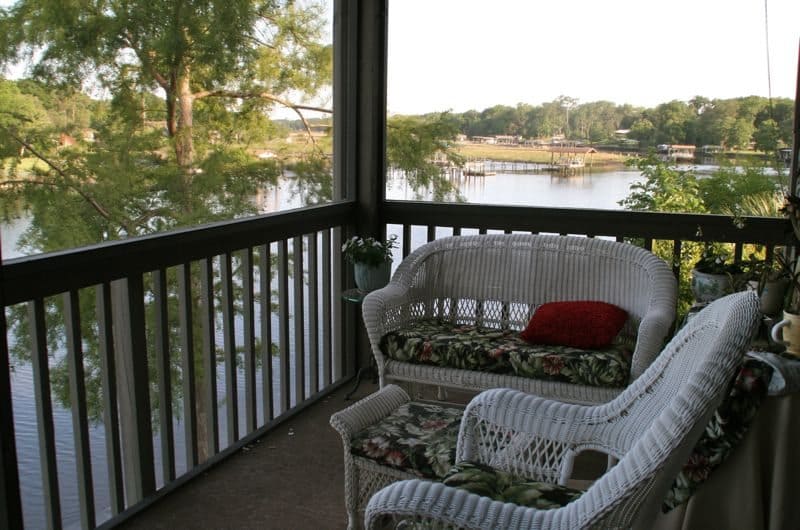
People all over the world are looking for house sitters to look after their homes while they are away.
You can stay in a whole house, often very comfortable or even luxurious, for absolutely nothing.
Your role in exchange varies: you’ll need to keep the house in good condition and usually you’ll need to look after pets too.
House sitting is an excellent way to add free accommodation to your travels.
House sitting has enabled us to visit places like Japan that we wouldn’t otherwise be able to afford, and has led to us visiting cities we wouldn’t have thought of.
We love staying in residential areas rather than the touristy parts of town, and getting to know a place by living like a local.
Stay for Free with Comforts of home
It’s also a great way to enjoy some home comforts while travelling. After months on the road a comfy couch, hot shower ,and well-equipped kitchen is just what we need.
House sitting isn’t just for long term travellers, as opportunities are available for a few days up to many months.
Why not plan your vacation around a house sit for an interesting and very affordable trip away?
Our Experience Housesitting
We have looked after a puppy and large house in the countryside of northern Argentina; a spacious condo overlooking the river, with a pool and four cats in Florida; and a traditional house and three cats in Kyoto, Japan.
Each of these has been for 3-4 weeks and we have saved about $5000 in accommodation costs and had some wonderful experiences.
How to Find a House Sit
Register with a house sitting organisation such as HouseCarers, Mind My House, or Trusted Housesitters, pay a small annual fee, create a profile, and keep an eye on listings that come up. When you find one that suits you apply to the owner via the site.
Tips for House Sitting
- Be flexible and you might have to go where the opportunities are.
- Create a detailed profile and include any relevant experience and a link to your blog if you have one.
- Sign up to daily emails from the house sitting website and apply quickly. House sits are competitive.
- Provide references. If you are starting out maybe house sit for a friend.
- Keep trying if you have no luck at first. You will be more successful choosing less popular destinations.
- The most opportunities are in North America, Europe and Australia.
House Sitting Pros: Saves money, you have a whole house to yourself, privacy.
House Sitting Cons: Have to look after pets (maybe a pro!), commitment to a certain period of time.
2. Couchsurfing
Couchsurfing is an organisation that connects people around the world.
A huge network of hosts offers their couches or spare rooms to travellers for absolutely free.
It’s about more than just free accommodation though, it’s a way to meet interesting people and tap into their local knowledge.
It’s a much more sociable experience than house sitting and is best for short term stays. Couchsurfing isn’t just for young travellers and we know families who regularly couchsurf.
Our Experience Couch Surfing
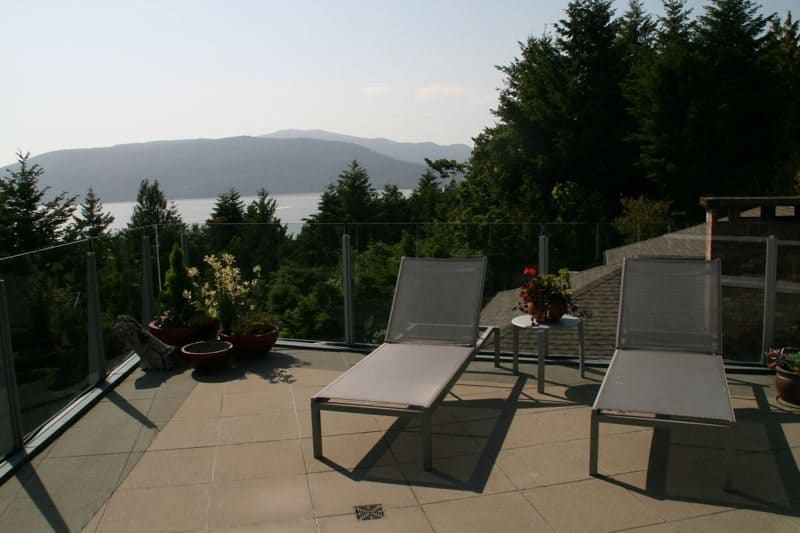
We have stayed in spare rooms in Argentina, Paraguay, Colombia and Canada.
All our experiences have been excellent, we’ve made some great friends and seen a different side to places that we wouldn’t have seen staying in hostels.
How to Find A Couchsurfing Host
Sign up to the couchsurfing website, create a detailed profile, search for a host using certain criteria (location, the number of people etc.), and send the host a couch request with your dates.
Tips for Couchsurfing
- Host couchsurfers before you travel to get a feel for how it works and build up some references.
- If you are worried about staying with strangers choose hosts who are vouched for and have lots of references.
- Send a personalised couch request, saying why you think you’ll get on with the host.
- Start with two nights and see how it goes. We usually extend our stay if it suits the host.
- Help out around the house and cook meals for your host.
- You don’t have to stay with someone. You could just meet for a coffee or attend a meetup that many couchsurfing groups organise (search for groups for the city you are in).
Couchsurfing Pros: Meet local people, no time commitment, saves money, access to local knowledge.
Couchsurfing Cons: Less privacy, may not be a comfortable sleeping area, might not get on with host.
3. Free Housing in Exchange For Accommodation
By working in exchange for your room and board you can save a lot of money on the road and have some really interesting experiences.
Many opportunities are on farms but you can also work in hostels and even private homes.
Usually you’ll work for four hours a day so you’ll have time to explore the area too, but make sure you agree the terms before you sign up.
Work For accommodation – Our Experience
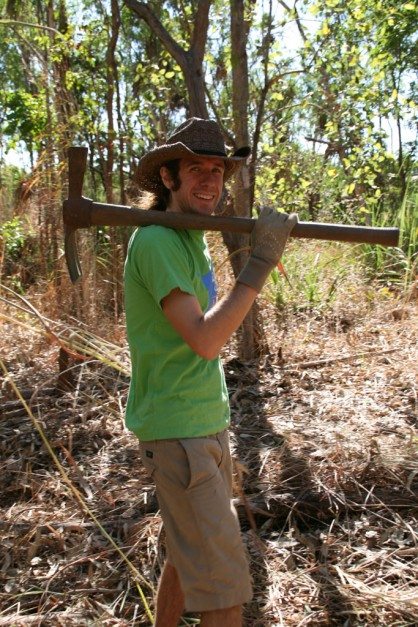
In Australia, we used the WWOOF (Worldwide Opportunities on Organic Farms) programme to find an opportunity in the Northern Territory.
We stayed with a family and helped in their large garden in exchange for meals and our own private room, bathroom, and wonderful outdoor lounge.
We got on really well with the family and loved our experience.
In Costa Rica, we used the HelpX website to find a placement at riding stables in a remote, untouristy part of the countryside.
We had to pay $20 a day but we only worked two hours a day and got to ride horses twice a day.
It was tiring but an amazing experience getting to know the horses and family, and I even got to ride with local cowboys in a traditional cabalgata (group ride).
How To Find A Work Exchange
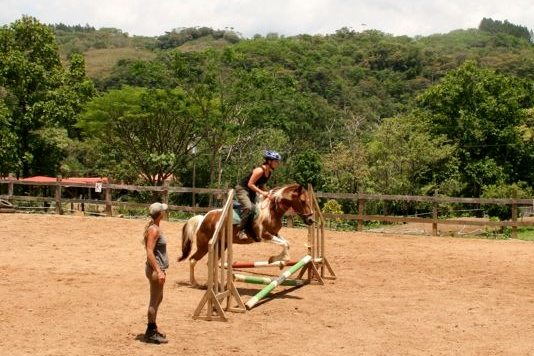
There are a number of websites where you can find placements.
Work Exchange for Housing Websites
WWOOF is the most well known, focusing on organic farms and you have to join the programme for each country you’ll be visiting.
HelpX and Workaway have a range of different opportunities all over the world.
After paying a small membership fee you’ll have access to listings that you can apply for.
You can also find opportunities informally, maybe by asking at hostels.
We arranged to stay at a lodge in the Peruvian Andes for three weeks in exchange for creating their NGO’s website.
Tips For Free Accommodation in Exchange for Work
- There are more opportunities in North America, Europe, Australia and New Zealand. In developing countries they sometimes charge a fee and accommodation standards are lower as they can get cheap labour locally so your services aren’t as needed.
- Agree your working hours, days off, included meals and type of accommodation in advance.
Work Exchange Pros: Interesting experiences, spend very little money in rural areas, could add it to your CV, provides a sense of purpose, meet people.
Work Exchange Cons: Living conditions could be basic or shared, you have to work!
These opportunities for free accommodation are a great way to travel inexpensively but they are much more than that.
They have taken us off the beaten track, introduced us to new friends, taught us about local cultures, and left us with some of our best travel memories.
Other Ideas for Free Accommodation
Home Exchange and Home Swaps:
If you own a home you can join a home swap community to exchange properties with other homeowners for an agreed-upon set amount of time.
We haven’t done this, but it is becoming increasingly more popular as it is a good way to find cheap accommodation.
Home Exchange Websites to check out are: Love Homeswaps, HomeExchange, AirBnB, and HomeStayIn
For more advice on travelling cheaply don’t miss Dave and Deb’s helpful post on how to travel on a budget.
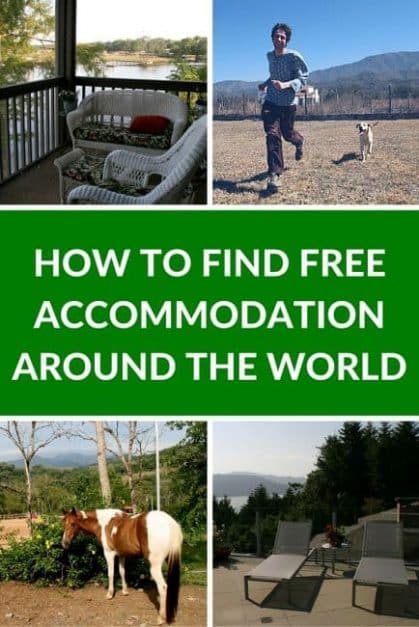
A very big thanks to Erin of Never Ending Voyage for sharing these great insights on how to find free accommodation around the world.
We have to work harder at finding free and cheap accommodation ourselves. These tips are a huge step to helping us make our future travels more affordable while having a great adventure.
Enjoy!
Read More:

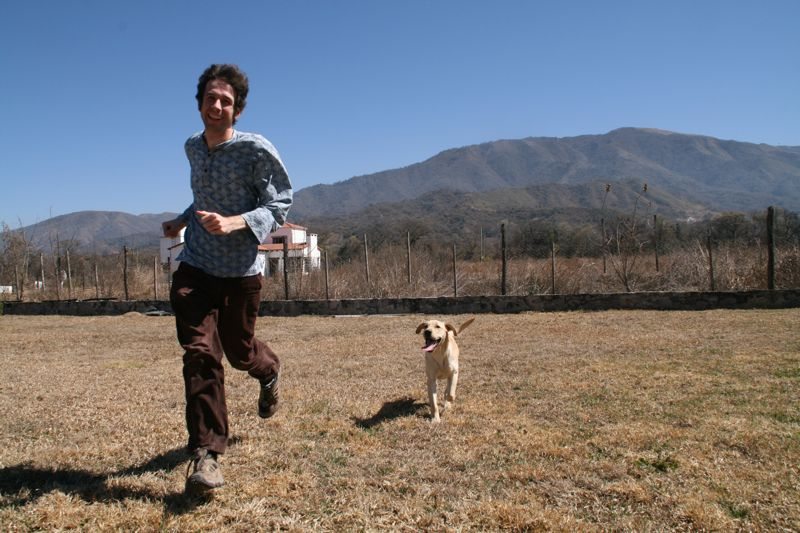



Couchsurfing is now charging a fee, even if you’ve been a member (signed up) for a long time. No way to do any surfing onsite unless you pay first. I’d like to delete my listing but can’t even get past the ‘pay first’ popup.
It’s hard to get these gigs these days depending on where you are and where you’re looking. A lot of places, the hosts who advertise never answer their email. Couchsurfing – a lot of hosts have long since stopped responding to requests, I’ve seen people who, like me, signed up back in like 2009 and even though they said they host they never respond to requests. A lot of the “work stay” type sites require a membership fee before you can contact anyone. I suppose the membership fee “pays for itself” in the long run but only if you find a gig before the membership runs out!! Or, people are wanting like a resume or CV or experience or references before they let you “volunteer” for no money just room and board. I’ve been at this for YEARS, people. Looking for free accommodation. Willing and able to do work even though I’m a woman – I’ve had people look at me in Quebec and slam the door in my face when I went somewhere over a DISH WASHING job. Like I look incapable of washing dishes, for God’s sake. And I’m a Maths teacher. And now with an EFL qualification. Or you’ll be in countries where you have to have “work” papers before you can volunteer somewhere for just room and board. Or you’ll be in such poor countries that people can’t afford to let you stay for free, and only the rich white gringos have “live in nanny” type positions available and they have room for only ONE and they get like 1,000 applicants from every stranded traveler who’s lost or had their bags and wallet and passport stolen and their Embassy is taking its sweet time getting them out of there because of bureaucratic red tape like “we require someone back at home we can contact for the money for your plane ticket” sort of rubbish. I’ve had all sorts of reasons why I’ve been unable to find free accommodation all these years of looking no matter what I tried. If I ASK people – then the problem is I speak English which makes them assume I’m an ‘American’ which means ‘rich gringa with a rich mummy and daddy back home so just ask mummy and daddy for more money” I’ve literally gotten that one even though I’m IRISH. And well over-30. (By now I’m “pushing 50”) Now, maybe it depends on what countries you’re trying – I’ve so far not found which countries you can easily find free accommodation even if you speak English so people think “American.” Most countries, if you speak English they not only overcharge you but outright rob you and steal your purse whenever they can, sometimes in broad daylight on a crowded street while onlookers do nothing even if you’re female.
I wish I know about this before I travel to Canada now I have 3 weeks leave here an nowhere to because I run out of money.. any kind person on here from Toronto areas can help me out please just for 3week
I should really look into house sitting
Housesitting and couchsurfing are great ways to save money you’d otherwise spend on accommodation. The increased local interaction that the working options provide surely provide a great way to meet people too.
Definitely great points. You really get a feel for living like a local when you stay with people or housesit.
I wish I read this before we started travelling! Ha.
We’re looking into Woofing now in Australia – Ideally trying to tie in some ‘seasonal’ work to secure a 2nd year visa!
Did guys hear anything about that when you were down under?
Thank you very much 🙂
I can say the same! Me and my friends loves to travel once a year! Even with the busy schedules we will always find time to set and plan for a vacation. Amazing and informative ideas this blog is. I wanna try CouchSurfing and working your way for accommodation and food! I think it will be fun!
Great post! I’ve tried couch surfing and work exchange in my life on the road but I’m yet to venture into housesitting. Its always exciting to find new ways of making my dream life last forever 🙂 find out more about what I’ve been up to on my website http://www.emilymeetsworld.com x
Some good tips here. In 2010/2011 house sat my way around Australia for 4 months, and stayed in a great resort in Queensland for 2 months afterwards. I found it on http://www.helpx.net have you heard of it? It includes alternatives to the highly physical Woofing!
I love hearing about other travelers who house sit. We have been full time travelers / house sitters for 12 months now (although started house sitting 13 years ago). It has saved us thousands of dollars since we started our nomadic journey! Not to mention all the beautiful homes we have lived in during our travels.
We’ve been fortunate to stay in million dollar properties, beach houses, english cottages, island homes and so much more. I highly recommend house sitting!
We haven’t tried the other methods listed here but they sound appealing too! Something to keep in mind when we can’t get a house sit!
South Molle Island in The Whitsundays is a spot where backpackers can work and stay for free. Check for details because the island closes at certain times of the year.
Great info about house sitting, couch surfing, and work exchange. I especially enjoyed reading the author’s personal experience of each method of free or nearly free accommodations.
Excellent tips – thank you! There is also a book available in most Australian bookshops and outdoor shops, a big thick book containing maps detailing all the free campsites around the country and their facilities. It’s simply entitled CAMPS. My mates and I found it invaluable on our road trip. Everyone loves a freebie! Woohoo!
Couch Surfing is an amazing site and we have met a great couple through this site – Thanks the recommending this site.
Our Vietnam Adventure
http://journeynz.blogspot.com.au/2012/02/vietnam-part-one.html
I’m trying Couchsurfing for the first time next week — wish me luck!
Good luck! I bet you have lots of fun!
I love these cheap alternatives to hostels. I’m still not sold on the couch surfing thing, but the WOOFing thing looks really cool.
WWOOFing is a really great idea and it can fit into the category of slow travel too! We have been hosts for three seasons and this year we plan to go somewhere as volunteers if events go as planned.
That’s true.We found it made a great break when we were burnt out from travelling around too quickly. It’ll be interesting to see your perspectives as volunteers after being hosts.
Great suggestions, but you forgot one – camping! We carried tents with us on our bikes and used them a LOT! Granted, that option won’t work in many places if you’re traveling on bus/train/etc, but it’s great when you have your own transport. It’s also perfect in Argentina where nearly every tiny town has a campground.
Good point Nancy! We haven’t camped since we’ve been travelling long term as we don’t want to carry all the equipment around (we travel with a carry on size backpack only). It totally makes sense when you have your own transport though.
Staying for free is a brilliant idea. I did wwoofing in NZ and it saved me a bunch of money in accommodation, plus you get to know the local area and people a bit better. Great article!
New Zealand has loads of interesting opportunities so it’s great you took advantage of them. We were there in the winter and couldn’t face doing outdoor work in the cold so gave it a miss.
What a comprehensive guide! I’ve always wanted to try housesitting.
Glad you found it useful Laura.
Hey, I recognize that patio in BC! Haha. I haven’t thought about WWOOFing in awhile, now I feel compelled to give it another chance.
Haha! It was an amazing view from that patio! WWOOFing has led to some really interesting travel experiences for us so hope you give it a go.
Amazing, I never would have dreamed there were such websites out there.
Glad we’ve introduced some new websites to you. Hope you get the chance to try one of them.
Great article. We have been traveling and house sitting in Australia for a while now and find it a great life style. For 2012 we are looking at going world wide, thanks for the tips.
Glad you’ve used these techniques successfully Gavin. Europe and North America are also great places to find house sits.
Great tips! I have done CS, but planning on WOOFing and house-sitting on the next go-round. 🙂
Enjoy! It’s a great way to travel.
Scott and I are looking forward to trying out housesitting. I think we would both really enjoy having a home to stay in rather than hostels. Great tips!
It does make a great break from hostels.
We’re big fans of housesitting, but couchsurfing isn’t really our thing (the events are cool to meet people, but we usually need our own space). We haven’t tried a work exchange yet, though; it’s something I’d really like to explore, but wasn’t sure how to get involved. Glad Erin and Simon shared these tips, as they’re very helpful!
Couchsurfing can be difficult when you need to work, so we tend to do it when we are taking some time off. We also always look for hosts with a spare bedroom as we need privacy too.
I’ve done all of these–I’m actually villa sitting at the moment, through friends of friends! Couchsurfing and WWOOFing were both awesome ways to really interact with locals and learn more about a culture. Great tips!
Word of mouth can be a great way to find house sits, especially when you are starting out. Glad you’ve enjoyed all of these too Christine.
This is a great article. My husband and I just started our year-long RTW trip in Chile and just created a CouchSurfing account. It seems like such a great way to meet new people and travel cheaply. I am so glad to hear that you have had a positive experience with it… And thanks for the tips!
That’s a great idea. I wish we created a CouchSurfing account before we left. I think that it is difficult now that we dont’ have a home to exchange with:)
Hi guys, it shouldn’t be too difficult for you, as there are plenty of members who don’t have a couch available. You could attend some couchsurfing meetups to meet other members and get some references.
I hope you enjoy couchsurfing on your trip Meg! We met some wonderful people through the site, even if we didn’t stay with them.
Great article. I’ve been hearing a lot about WWOOFing recently and think it is the most reasonable way to do a long-term journey in Australia if you’re beyond the age restrictions for student / work visas.
It’s hard to believe that a year ago we didn’t know what Wwoofing was, now it has become very popular. Definitely the way to go and it seems very much like a good option for Australia.
I definitely agree with that. There are so many interesting opportunities in Australia and it really helps keep costs down in such an expensive country. It’s a good option for New Zealand too.
Great tips. I have heard of these opportunities but have yet to try them out for myself. Maybe something for 2012.
We’re the same way. We’ve never really understood how they worked so it was awesome to read this article. We think that one of these is in store for 2012 ourselves. I’d like to work on a vineyard I think
Ooh, I’d love to work on a vineyard too, and an olive grove. And just imagine the home cooked food if you WWOOFed in Italy!
We’d definitely recommend any of these Stephanie! Buenos Aires has an amazing couchsurfing scene if you are still there.
Great tips in getting to fun places and not paying for your stay. I really like the work exchange (WOOF) suggestion. Very practical and a great way to really get to know people in the country you visit.
I will pass your link on.
I like the idea of Woofing as well. We’re going to have to give it a try ourselves.
It is a great way to get to know another side of a country Kelly. We really enjoyed seeing untouristy parts of Australia and Costa Rica. Hope you try WWOOFing!
I like the couchsurfing idea. I’ll have to check out the website. Are there any protections for those who are couchsurfing, to be sure you’re heading to a safe, reliable place?
Couchsurfing has a vouching system so you can look for hosts who have been vouched for, and also look for people who have lots of positive reviews. We have never had a bad experience, or heard of anyone who has. Hope you try it Christian!